Are you planning a trip to Egypt soon? If yes, then ensure you don’t fall for any tourist scams in Egypt!
Honestly, I thought people were exaggerating about the scams here because it can’t be that bad, can it? Well, spoiler alert, it is quite bad here.
As an Indian, I never thought I would ever come across a country that could leave Indians behind in scamming and tourist harassing but that’s what I faced when I traveled to Egypt.
While the pyramids, Red Sea, desert, and everything were, in fact, fairytale-like, the scams and the constant tourist harassment made the experience a little less than amazing.
However, there is a good news! If you prepare in advance (with the help of this guide), you can easily navigate these situations and enjoy your trip without stress.
In this detailed guide, I’ll take you through the most common scams in Egypt, give you real-life examples, and share tips on outsmarting even the most persistent scammer.
So grab a chai, sit back, and dive into this survival guide—Egypt edition.
Common Scams in Egypt 2024: A Complete Guide to Spotting and Avoiding Them
The Camel Ride Scam
Personally, I have stopped riding animals so, I personally didn’t face this scam.
However, a lot of hostel owners and locals did warn me that this scam is quite common and many tourists get caught up in it.
If you don’t have any qualms of riding an animal, then I am sure taking a camel ride at the Giza Pyramids must seem like a dream to you.
Unfortunately, this can turn out to be a bad experience if you encounter a scammer here.
So, what happens is you take a camel ride and negotiate the price, say 100 EGP, for a ride around the pyramids. Once you’re on the camel, the handler suddenly demands more money. It is generally 5-10 times more of the initially agreed cost to let you down.
If you refuse, they may become aggressive or simply walk away, leaving you stranded.
Sadly, this happens a lot at Giza and other popular sites. Sometimes they might even offer the rides for ‘free’ and then later charge you hefty amounts.
How to Avoid It:
- Book camel rides only through reputable tour operators or guides.
- Confirm the total cost beforehand, explicitly including the descent. Get a written receipt, if possible.
- Avoid riding camels at sites where handlers seem overly pushy or aggressive.
- If threatened, stay calm and call for help; security is usually present at major tourist locations.
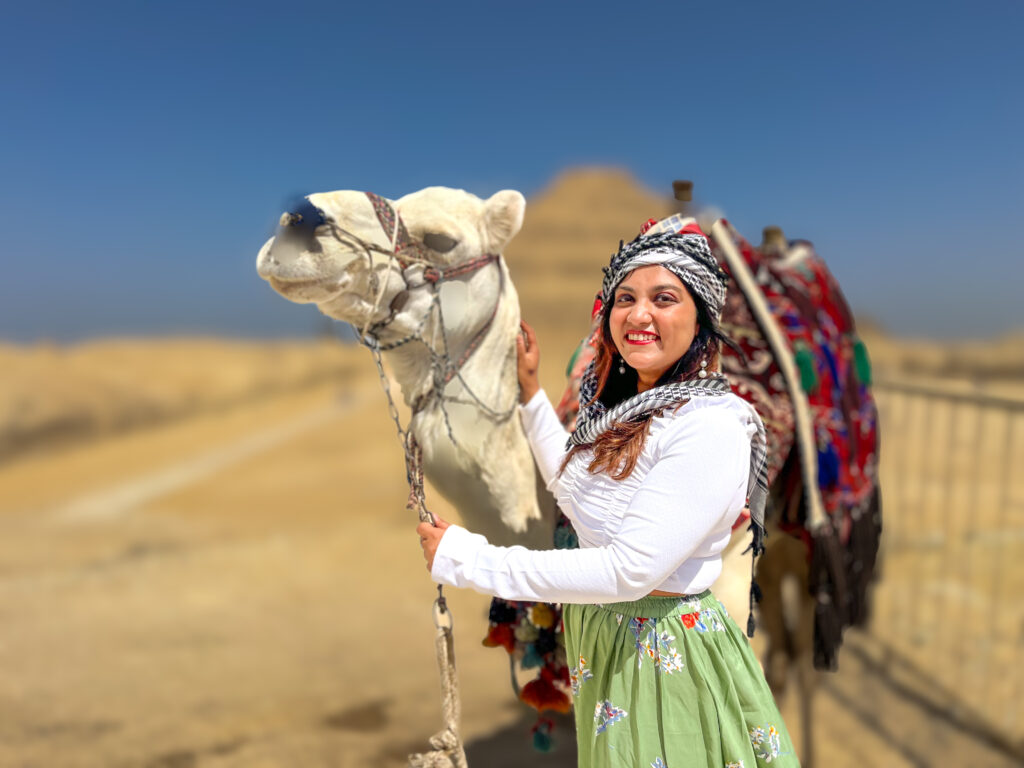
Airport Scam
Okay, this one might be a little shocking but when I was researching about drone laws in Egypt and whether you can take your drone inside the country or not, I came across some really disturbing news.
A couple of people had their drones confiscated at the airport as it is illegal to have it here without the proper permissions. While some of them got it back, a few didn’t get it back as they didn’t take the proper receipt at the airport.
So, when they were departing from the country to pick up their drone, they were informed their drone is not there and since they don’t have any receipt, there is no proof of them owning one.
Imagine, losing a gadget worth hundreds of dollars because you were not careful of the local laws.
Airport scam is not common in Egypt but honestly, I am not one to figure it out by losing an expensive gadget.
How to Avoid It
- Always check if someone is illegal to carry into Egypt and don’t take it with you.
- If you do take an expensive gadget which gets confiscated, then take an official receipt and a photo of the drone for reference.
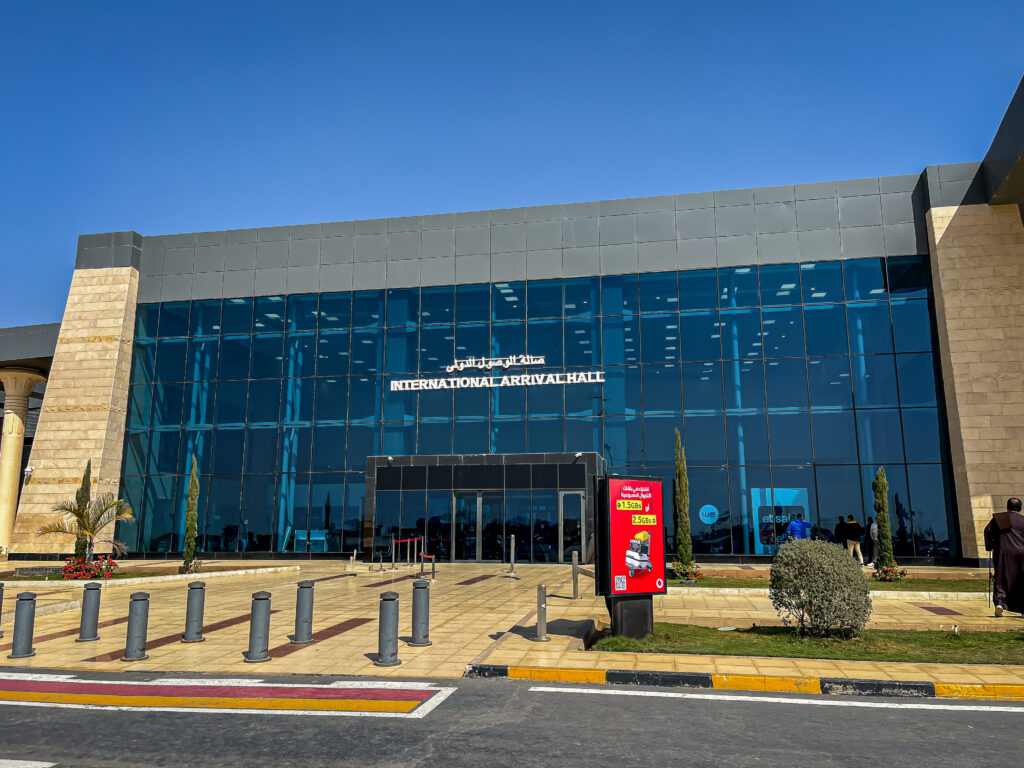
Fake Papyrus Scam
Another one of those scams that I didn’t personally experience but heard from my fellow travelers is the papyrus factory scam.
Papyrus is quite popular in Egypt and makes for a good souvenir. It is an ancient form of paper made from reeds and you can find it in the local markets here with hieroglyphics and Egyptian Gods.
However, more often than not, they will sell you fake papyrus scrolls.
They will invite you to their ‘government-certified’ papyrus factory to watch how it is made and then pressure you into buying the trinkets.
A lot of times, the scrolls are banana-leaf imitations passed off as real papyrus. Plus, they are sold at exorbitant prices, leaving unsuspecting tourists with overpriced, low-quality goods.
How to Spot a Fake:
Genuine papyrus has a distinct grid-like texture and is durable. You can hold it against light to see how thick it is. Fake ones are usually smoother and tear easily.
How to Avoid It:
- Check for reputable stores before purchasing papyrus and opt for certified government outlets only.
- Check the durability of the material by bending it slightly. Real papyrus doesn’t tear or wrinkle.
- Compare prices—authentic papyrus is pricier.
The “Closed Attraction” Trick
Imagine arriving at a famous landmark in Egypt—perhaps the Egyptian Museum in Cairo or the Valley of the Kings in Luxor and being told it is closed.
Disappointing? Yes. Truth? Perhaps not.
In this scam, a friendly local will tell you that the attraction is closed today and will offer to take you to a better place.
They basically want to take the tourists to shops, eateries, or even fake attractions where the scammer earns a hefty commission.
You might be taken to a perfumery, a carpet shop, or a papyrus store. Once inside, you’re subjected to aggressive sales pitches and guilt-tripping, all because someone lied about a site being closed.
How to Avoid It:
- Check the official Egypt website – https://egymonuments.com to buy tickets and get information on whether an attraction is closed or not.
- Ignore anyone claiming a site is closed unless it’s an official staff member wearing a badge.
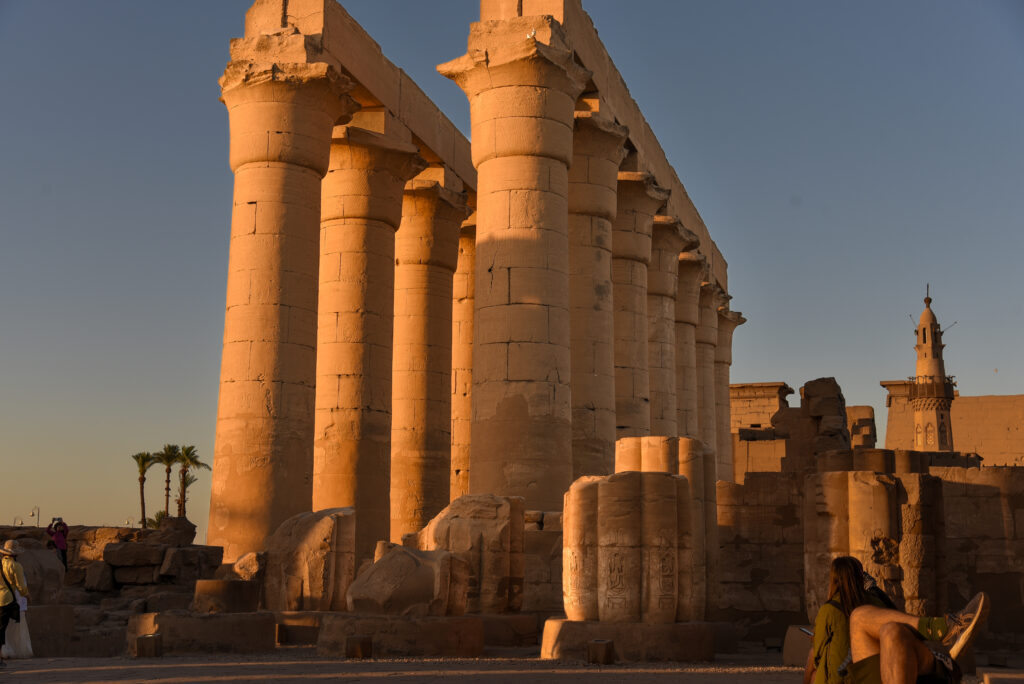
Bazaar Bargains and Overpricing
Well, this might not be a scam per se but haggling is quite common in Egypt.
So, if you aren’t good at it, then be ready to pay hefty prices for the most basic things in this country.
Vendors are experts at sizing up tourists and quoting outrageously high prices—sometimes 300–500% higher than the item’s actual worth. I honestly fell for it in Aswan when exploring the Nubian Village.
No matter how much you bargain, you will still end up paying more than the price because you don’t know the actual cost or the shopkeeper is pressuring you buy it.
Throughout my Egypt trip, I faced this and while I did get better at bargaining and getting the price reduced as the trip continued, the initial loss I suffered due to a lack of knowledge was still there.
How to Navigate It:
- Research typical prices for popular items before visiting bazaars. You can ask your hostel/hotel owner as well.
- Start negotiations at 50% of the quoted price and gradually work up.
- Walk away if the vendor doesn’t agree to a fair price—they may call you back with a better offer.
Insider Tip:
Visit local markets away from tourist areas for more authentic pricing and a less aggressive sales approach.
The Currency Switching
Another one of the popular scams in Egypt that you might come across is the currency switching.
What happens in this scam?
Well, the Egyptian Pounds’ denominations look a little similar, especially if you are new to it. So, a few people try to take advantage of this.
How the Scam Works:
You hand over a 200 EGP note to pay for an item. The vendor cleverly switches it for a 20 EGP note and then accuses you of underpaying. Embarassed, you might hand over another 200 EGP note, effectively paying double of the actual cost.
This scam typically happens in busy areas like markets, taxis, and even restaurants where the environment is chaotic.
How to Avoid It:
- Make sure to understand the currency denomination before your trip.
- Always count your money in front of the recipient and announce the amount clearly.
- Use exact change whenever possible, especially for small transactions.
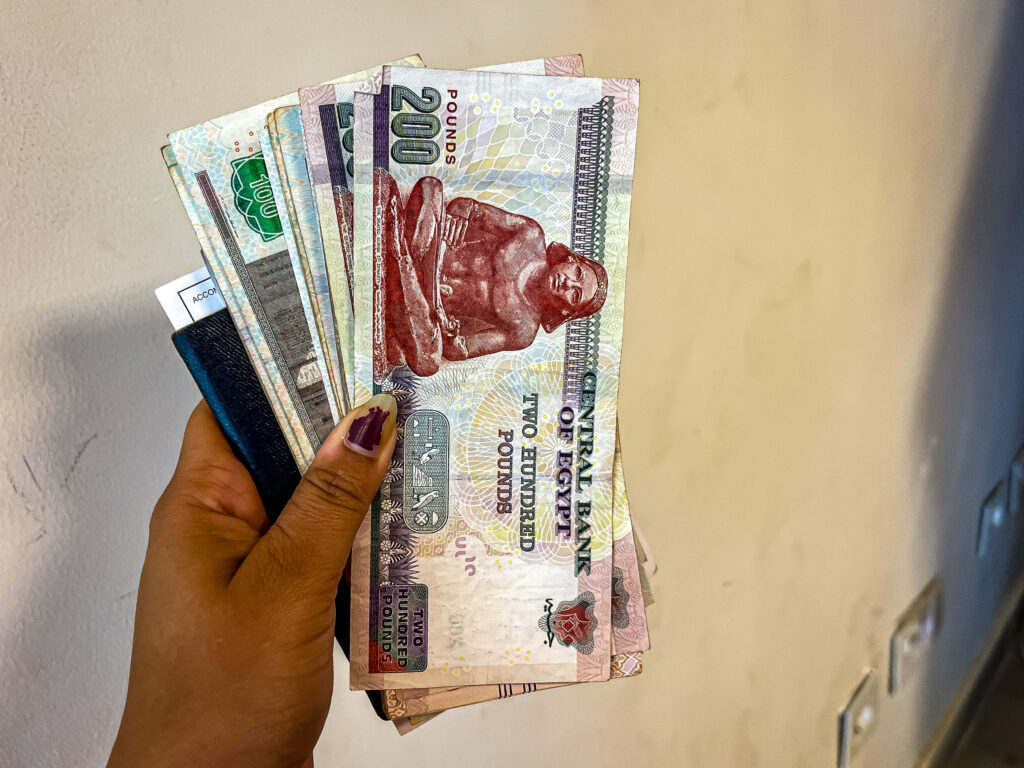
The “Helpful Local” Scam
One of the most common Egypt scams that I noticed on my trip was how people would come to help you when they find you looking a bit lost.
They will approach you with a beaming smile and offer to help you. It’s all well and fine until they start asking you a tip for helping them out or buying something from a shop where they sell overpriced items.
This is a popular scam in tourist-heavy areas like downtown Cairo, Luxor, and Aswan. Scammers try to take advantage of your confusion and earn some extra cash.
Real-Life Example:
Throughout my stay, I was approached by several local men who would chat me up and then ask me to look at their shop nearby for some ‘unique’ souvenir.
In fact, when I was staying near Giza Pyramids, I had a hard time navigating the restaurants in the evening because all the shop keepers wanted to chat and sell me something. It really became frustrating after a point.
How to Avoid It:
- Politely but firmly decline unsolicited assistance.
- If you genuinely need help, approach a shopkeeper, official, or family group instead of accepting random offers.
- Stay busy on phone and ignore if you hear people trying to talk to you and inviting you inside their shops.
Egyptian Shop Pressure
Of course, when you are traveling to Egypt, you cannot miss out on buying the exquisite perfumes, alabaster souvenirs, and more that are made here.
But beware of the popular Egypt tourist scame where the shops use aggressive sales tactics and overcharge the unsuspecting visitors.
What Happens:
You’re invited into a factory/shop for a “free demonstration” and they serve you tea and snacks while explaining the history and the uses of the product.
Before you know it, you’re being pressured to buy the product at exorbitant prices. In some cases, these products might be a fake
Why It’s Hard to Say No:
Egyptian hospitality is warm and inviting. Once you accept their tea or sample their products, you may feel obligated to make a purchase, even if you didn’t plan to.
I did face this multiple times and bought alabaster souvenirs from a factory. Honestly, I still don’t know if it is real or not but I did make sure to bargain a little and pay 50% of the amount that they initially quoted me.
How to Avoid It:
- Research the shops and the prices if you are interested in buying.
- Decline invitations for demonstrations if you’re not interested in buying. If they persist, then watch the demonstration but decline the offer to buy the product.
- If you decide to purchase, negotiate prices—don’t accept the first quote.
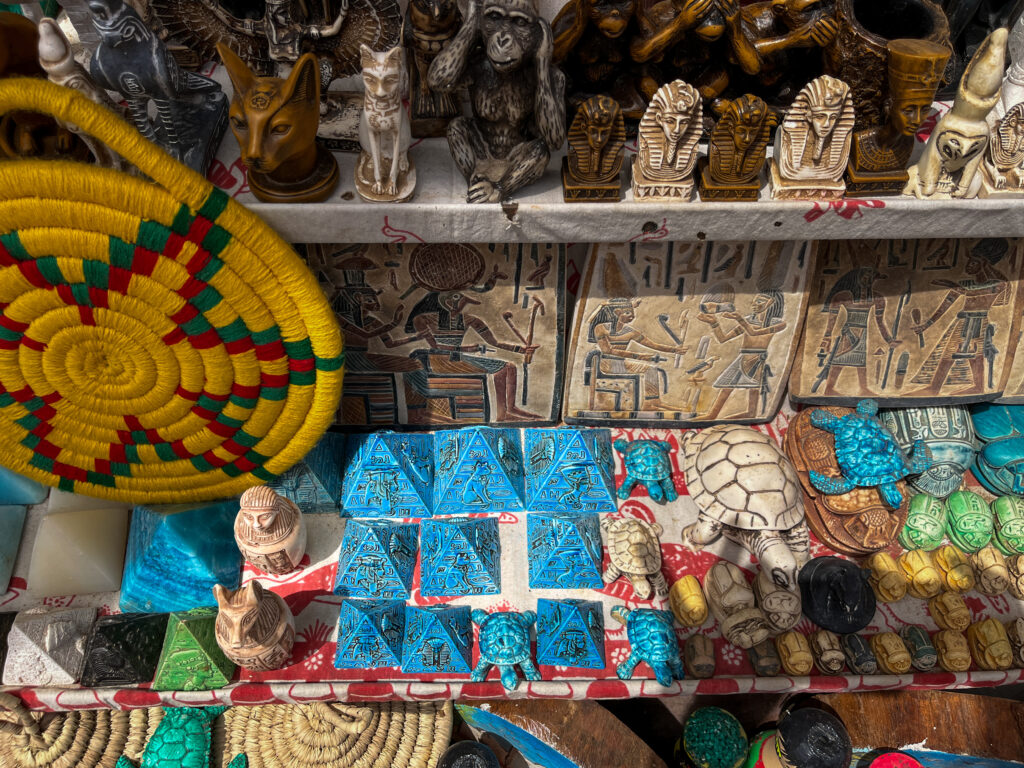
Taxis Without Meters or Rigged Meters
Taxi scams are among the most common tourist traps in Egypt, and they come in various forms.
Some drivers claim their meters are “broken” and insist on a flat rate, which is usually several times higher than the actual fare.
Others use rigged meters that tick faster than the seconds on a stopwatch. If you’re unfamiliar with the city or its typical fares, you might unknowingly agree to pay an exorbitant amount.
That’s not all, some drivers might “accidentally” take the longest route possible to inflate the fare while others might quote a price in US dollars instead of Egyptian pounds, confusing unsuspecting travelers.
Thankfully, I never faced this issue as I always used the local app like Careem or InDrive to book a cab. For cities which didn’t have these, I always made sure to check the taxi fare with my local friend or hotel/hostel owner.
That being said, I did pay a bit more at 1-2 locations because I didnt’ have an idea of the taxi fares and wish I had checked with multiple sources before booking one.
How to Avoid It:
- Always insist on using the meter, or agree on a fixed price before the ride.
- If using a taxi, carry small bills to avoid claims of “no change.”
- Research the taxi fare for your trip and ask with a few people about the fair rate before booking a taxi.
The Overpriced Nile Felucca Ride
Sailing on a felucca (a traditional wooden boat) along the Nile River is a quintessential Egyptian experience.
However, sometimes you might be overcharged it.
I was lucky enough to enjoy a 1-hour Felucca Ride in Aswan for 200 EGP which I found to be reasonable but most others ask to be paid 500-1000 EGP.
But I was being pushed to take a 2-3 days Nile cruise on the Felucca which made me a little uncomfortable and I wished I wasn’t alone on the boat.
Solo traveling in Egypt as a female can be tricky and this was one of those incidents which made me realise I shouldn’t be cavalier with my activities in Egypt.
How the Scam Works:
You approach a felucca captain, and they quote a price for an hour-long ride.
After you set sail, the captain either cuts the ride short or demands additional payment midway, claiming the original price only covered part of the journey.
In some cases, the felucca may not even be seaworthy, leading to a less-than-pleasant experience.
How to Avoid It:
- Negotiate the price and duration of the ride beforehand, and ensure it’s all-inclusive.
- Book through a reputable tour operator to avoid surprises.
- Be prepared to walk away if the captain seems evasive or pushy.
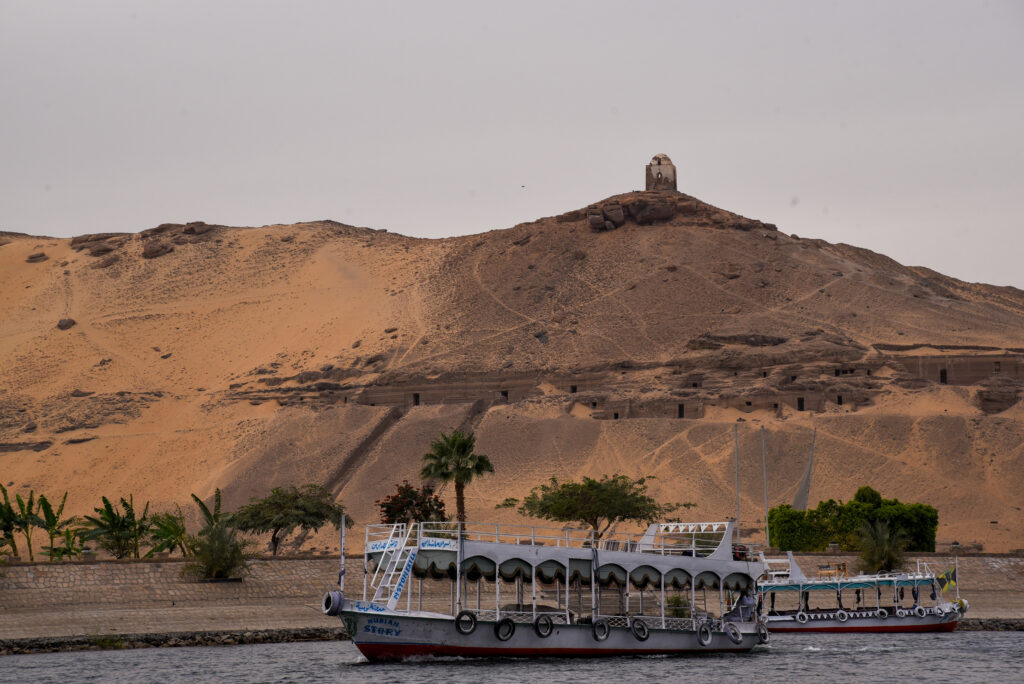
“Free” Gifts
I have lost the count of the times some local man in Egypt offered me a free souvenir, cab ride, or something.
You will find the friendly locals approaching you and saying, “For you, my friend!” while handing you a bracelet, scarf, or other small item.
It seems like a kind gesture, until they demand payment after you accept it.
How the Scam Works:
Once the item is in your hands, the scammer pressures you to pay. If you try to return it, they may guilt-trip you by saying, “Why don’t you appreciate my generosity?”.
Tourists often feel too awkward to refuse and end up paying inflated prices for something they didn’t want in the first place.
How to Avoid It:
- Politely but firmly decline any unsolicited gifts.
- If someone insists on handing you something, do not take it, even as a courtesy.
- Remember, nothing is truly free in tourist-heavy areas.
Restaurant Bill Padding
You sit down at a charming café overlooking the Nile, order a delicious meal, and enjoy the view.
But when the bill arrives, something seems off. It is much higher than you expected!
How the Scam Works:
Some restaurants inflate bills by adding items you didn’t order or subtly increasing the price of menu items. Others might tack on excessive “service charges” or hidden fees, hoping tourists won’t notice.
A few dont’ have any menus and then ask you later for a ridiculous amount of money for the most basic items.
You will find them set up outside bus stations, train stations, and popular tourist spots. They don’t have a menu and will ask you your order and once done, they will ask you thrice of what you would normally pay for it.
The only way to avoid it is by asking the price upfront and eating at places that do have a menu so that you aren’t overcharged.
How to Avoid It:
- Ask for a menu with prices and confirm them before ordering.
- Double-check the bill against your order and question any discrepancies.
- Pay in cash whenever possible to avoid issues with credit card overcharges.

The “Police” Officer Scam
This scam is particularly alarming because it plays on tourists’ trust in authority.
You’re approached by someone dressed as a police officer, often near an ATM or at a busy tourist site. They claim they need to check your wallet or passport for “security reasons.”
How the Scam Works:
The fake officer pretends to inspect your belongings but subtly pockets cash or valuable items during the process.
They may also issue fake fines for made-up offenses, such as taking photos in restricted areas, and demand immediate payment.
Tourists are often hesitant to question authority figures, especially in a foreign country. The scammers exploit this hesitation to carry out their schemes.
How to Avoid It:
- Ask for identification if someone claims to be a police officer.
- Refuse to hand over your wallet or passport unless at a police station.
- If you feel unsafe, move to a crowded area and seek help from actual authorities.
The Tipping Scam
In Egypt, tipping—referred to locally as “baksheesh” is a common practice.
While tipping is generally a way to show appreciation for good service, tourists often get scammed which can be frustrating.
How does it work:
Well, it starts innocently. A local will offer you help like giving directions, taking your photo, or showing you around. And once you take them up on their offer, they will ask you baksheesh for the ‘help’.
Although, you are not obligated to pay, but you might not want to seem rude so you shell out a few bucks. Sometimes, they might harass you for more money. Honestly, it is a never ending cycle.
Another thing that I observed was at several of the tourist sites, the guards would offer to take photo or show a shortcut to you and then ask you for a tip for the same.
This can easily ruin your experience if you don’t have any change on you or if you cannot grow a thick skin and just say no.
How to Avoid It?
Be selective about who you tip and for what. If someone offers unsolicited help, it’s okay to decline politely.
Keep small bills handy for situations where a tip is genuinely warranted, such as excellent service at restaurants or guidance from official staff.
Most importantly, don’t let yourself be bullied into tipping more than you’re comfortable with.
Inside Tip:
You are not required to tip for the buses you take in Egypt but some people might ask you money to store your luggage. This happened to me while going from Luxor to Cairo and then Cairo to Siwa.
Unfortunately, I did not know if it is a legit fee or just a scam but was informed by an Egyptian women later that it is a scam. In such a case, it might not be possible to say no, but you can keep change of 5-10 Egyptian Pound to pay to whoever asks for it.

The Nile Cruise Scam
I feel not enough people talk about it but for me, one of the biggest tourist scams in Egypt was the famous Nile Cruise.
Don’t get me wrong, the Nile cruise experience is amazing. The rooms, food, the views, everything is top notch. But it is the worst way for visiting the Edfu and Kom Ombo Temples.
Why?
Well, because if you book through a local operator, you get the most basic experience. This doesn’t include a guide, auto to the Edfu Temple, or the ticket price included. You will have to pay extra for all these.
But honestly, it is still not worth it as you get only 1-1.5 hours at each temple which is not enough time to learn about the history of these temples or explore it a bit.
Add to it the thousands of tourists that visit it at the same time as most cruises have same timings.
How to Avoid It
- Book Nile Cruise only for the experience and not the temples.
- Visit the temples from Aswan or Luxor. You can do a day trip for 50 USD for a cab which can be shared with 3-4 people to reduce the cost.
- Don’t buy expensive Nile cruise packages, opt for the local operators as they are cheaper and worth the money.

So, that’s my experience in a nutshell. Egypt is a land of scammers, there is no denying that. I love the country for its culture and sites but handling people here is a bit of a task.
If you are traveling solo, you have to be more careful. I hope this guide helps you stay clear of these scams and ensure that you have a pleasant trip in Egypt.
I would personally recommend you avoid visiting Egypt as a solo female traveler and travel with at least a friend or fellow solo traveler.


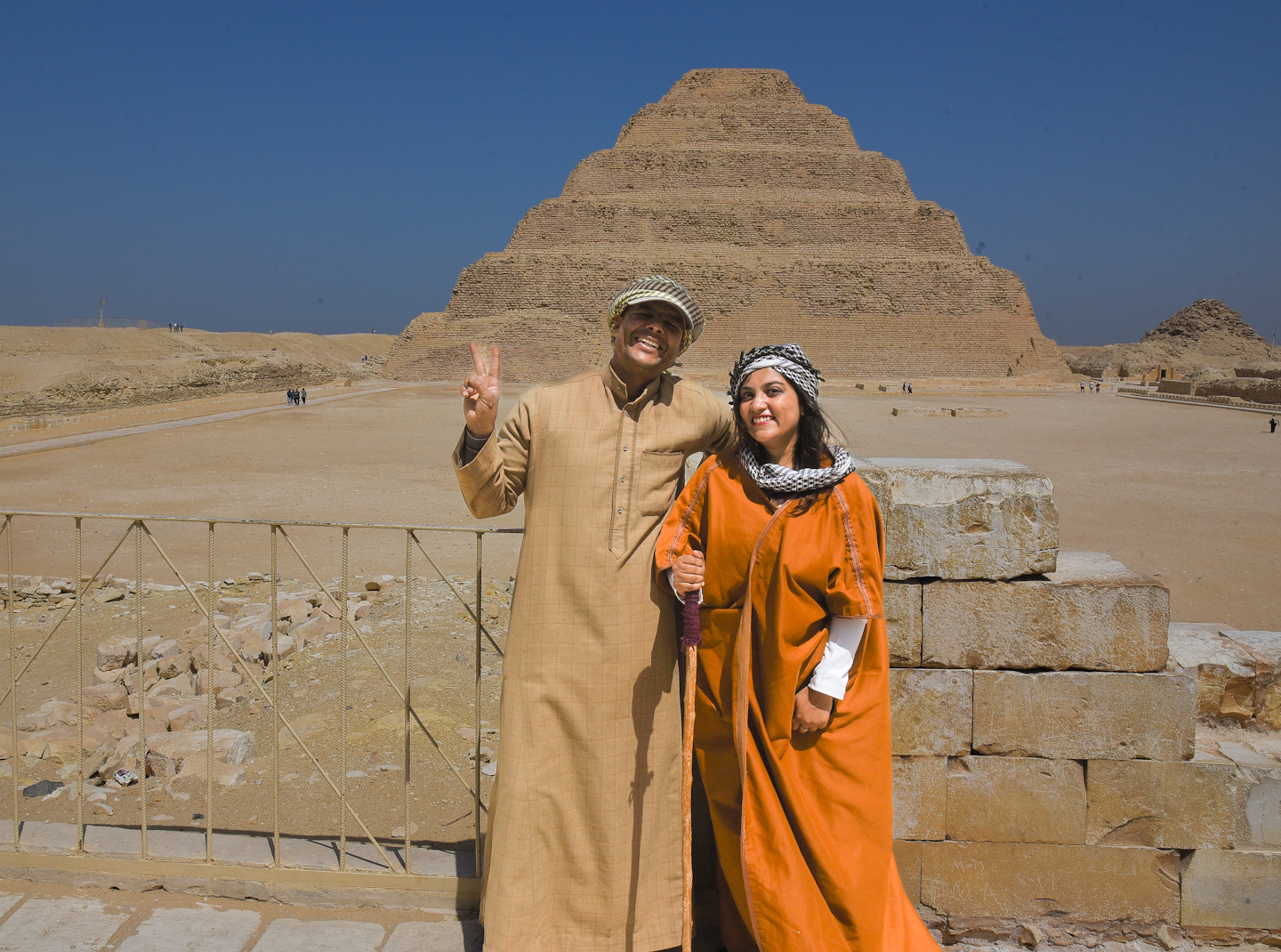
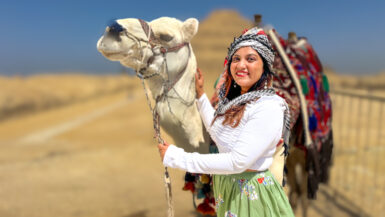


Leave a reply